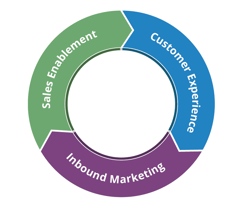B2B marketing plans are often more challenging to define and implement than B2C ones. This complexity arises because B2B plans must incorporate a broader range of variables and diverse approaches. These plans are tailored to meet businesses' specific needs and intricacies, which often involve longer decision-making processes, multiple stakeholders, and a focus on building long-term relationships. Unlike B2C marketing, which focuses on reaching a broad consumer audience with more straightforward purchasing decisions, B2B marketing requires a deep understanding of each target business’s unique needs, industry dynamics, and the value proposition of the products or services offered. Here are five comprehensive tips for creating an effective B2B marketing plan that can greatly enhance lead generation and drive business growth:
1. Understand Your Audience
Before you create a marketing plan, thoroughly understanding who you are communicating with is crucial. This involves delving deeply into your target audience's demographics, preferences, pain points, and buying behaviors. By comprehensively understanding your audience, you can tailor your messaging, choose the most effective channels, and design campaigns that resonate personally. Without this foundational knowledge, you risk squandering valuable resources on marketing efforts that fail to connect with potential clients, leading to inefficient use of time, money, and effort. In essence, knowing your audience is the cornerstone of any successful marketing strategy, enabling you to craft a plan that reaches, effectively engages, and converts your target market.
2. Rely on More Than Just Your Online Marketing Channels
In the realm of B2B marketing, there's a common misconception that solely relying on online marketing strategies will be enough to achieve success. However, this belief often falls short of the mark. While digital channels are undeniably powerful and offer broad reach, they cannot fully replace the nuanced, personalized approach required for B2B transactions. Products and services provided to companies must be meticulously tailored to meet each business's unique demands, challenges, and operational dynamics. This means understanding the specific industry in which the company operates, the particular pain points it faces, and the strategic goals it aims to achieve. A comprehensive B2B marketing strategy should integrate both online and offline methods, leveraging not only digital platforms but also in-person interactions, such as trade shows, industry events, and direct meetings, to cultivate deeper business relationships and ensure that the solutions provided are precisely aligned with the company's needs and objectives.
3. Guide Your Prospects to the Desired End Goal
Creating a detailed roadmap of your clients' initial interactions with your company is crucial when they purchase your product. This process thoroughly analyzes various touchpoints where potential customers engage with your brand for the first time. You must pinpoint the specific elements or messages that capture their attention and draw them in. It’s not just about the first impression but understanding their journey through your marketing funnel. You must delve into what specific information they seek at each stage of their decision-making process, ensuring that your content and communication align with their needs and expectations. Furthermore, strategically determine the optimal moments to deploy Calls to Action (CTAs) that guide them toward the next step, whether signing up for a newsletter, requesting a demo, or purchasing. Each point of interaction should be carefully crafted to enhance their experience, build trust, and smoothly lead them toward conversion, ultimately fostering a strong and lasting relationship with your brand.
4. Analyze and Improve Each Step of Your Sales Process
Even though you have meticulously defined each step of your leads’ journey to becoming customers, it is essential to recognize that the market is ever-evolving, presenting new challenges and opportunities. In this dynamic environment, it is crucial to remain agile and responsive by continuously adapting your sales processes to align with emerging trends and customer expectations. As a marketer, committing to ongoing professional development by enhancing your skill set, honing your logical thinking abilities, and expanding your knowledge base is essential. This involves keeping abreast of the latest market trends and gaining a deeper understanding of customer behavior, preferences, and evolving needs. By immersing yourself in up-to-date industry research, attending relevant seminars, and engaging with thought leaders, you can anticipate shifts in the market and identify potential opportunities before they fully materialize. Additionally, regularly evaluating the effectiveness of your current strategies and tactics will provide insights into areas that require refinement. This proactive approach enables you to make data-driven decisions, optimize your sales processes, and ensure that your marketing efforts remain relevant and impactful in meeting the changing demands of your target market.
5. Make Sure Your Plan is Aligned with Your Business Needs
Many times, managers misjudge their businesses’ needs and build out marketing plans based on these misjudged needs, which can lead to ineffective strategies and missed growth opportunities. This often happens because managers rely on outdated assumptions or fail to adequately assess the current dynamics of the market and the broader economic environment. Even though your business goal is to grow your profits right now, if the market and economic environment are telling you something different, such as indicating a shift in consumer preferences, technological advancements, or emerging competition, your business goal(s) should change accordingly. It is crucial to remain flexible and open to revisiting and revising your objectives to align with these external factors. Just because your business was successful in the past, leveraging strategies that worked well in previous years, that doesn't mean your business will continue to be successful without adaptation. Market conditions continuously evolve, and what was once a profitable approach may no longer yield the same results. A marketing plan aligned with the business's current and realistic needs will help ensure that the right pieces are in place to handle any market or economic environment changes.
Developing a successful B2B marketing plan requires careful consideration of numerous variables that extend beyond the scope of traditional B2C strategies. By understanding your target businesses' unique challenges and needs, integrating both online and offline marketing channels, and continuously analyzing the customer journey, you can create a plan that drives meaningful engagement and long-term business relationships. Aligning your strategies with your business's current needs and remaining agile in the face of market changes will further strengthen your approach. A well-crafted B2B marketing plan is a dynamic roadmap to guide your organization toward sustained growth and success in an ever-evolving marketplace.
If you're interested in discussing your current marketing strategy and how you can optimize your approach to B2B marketing, we invite you to schedule a consultation with our team.


.png?width=80&height=80&name=diamond-badge-color%20(1).png)





.png?width=250&name=diamond-badge-color%20(1).png)
